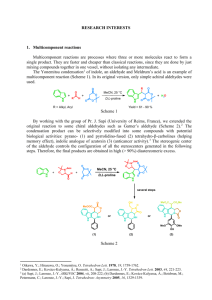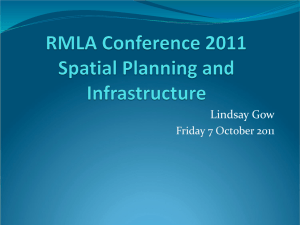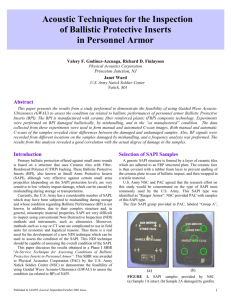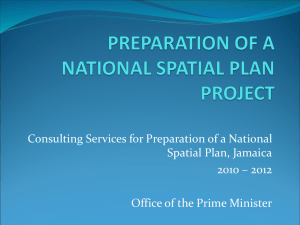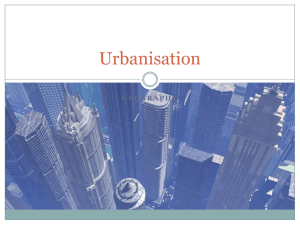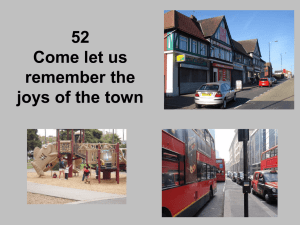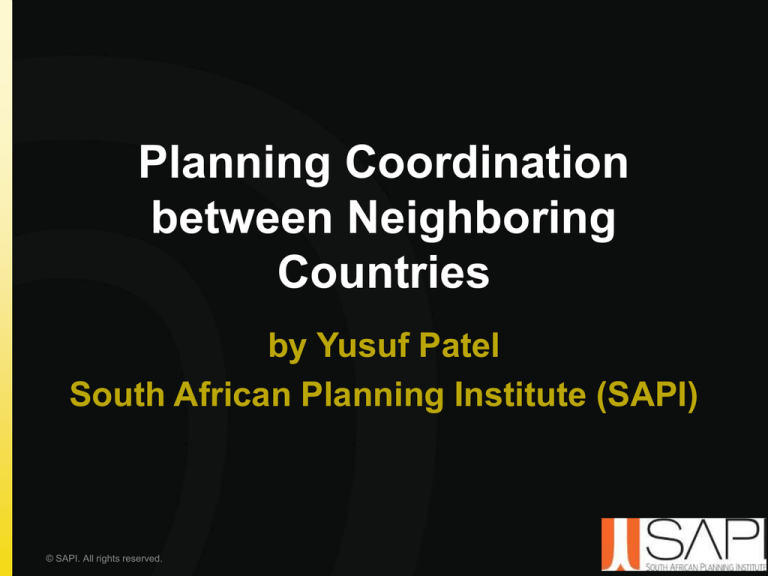
Planning Coordination
between Neighboring
Countries
by Yusuf Patel
South African Planning Institute (SAPI)
© SAPI. All rights reserved.
“Making Great Places”
Great Places
attract
investment that
creates jobs
How do we
make border
towns/cities
Great Places?
Requires
Planning
capability
Regional
Development
approach
© SAPI. All rights reserved.
Great
Places
•
Safe, clean and healthy for residents and visitors
•
Good infrastructure and basic services
•
Appealing and attractive public spaces
•
Unique features and attractions
•
Education, culture, knowledge, innovation
•
Connectivity
© your company name. All rights reserved.
Title of your presentation
How are border
towns/cities different?
•
•
•
•
•
•
Border
Towns
Gateways between nations
Tourism
Trade facilitation
Transportation
Security
Cosmopolitan
Goal: To further socio-economic
cooperation and integration as
well as political and security
cooperation amongst 15 Southern
African countries
© SAPI. All rights reserved.
Beyond
Borders
(Opportunities)
Regional Development
“In the 21st century ………. the focus of regional development is
more on the spatial dynamics of regions – as places to live, work
and invest. The focus for the discipline is just as much on people
as drivers of regional development as smoke stack industries,
regional development agencies and firms. People with their
knowledge and where and how they use that knowledge is a key
focus for research in regional development.”
Dr Tony McCall
© SAPI. All rights reserved.
Beyond
Borders
(Opportunities)
New Regionalism
“Effective local governance is necessary to ensure regional competitiveness and
sustainability in an increasingly globalised knowledge economy. Local governance
becomes a key strategy in the promotion of regional development.
New Regionalism connects increasing globalisation with the emergence of a
knowledge- based economy. In a knowledge-based economy employment growth and
regional prosperity are dependent on the generation and deployment of economically
useful knowledge through the processes of localised learning and innovation.”
Dr Tony McCall
© SAPI. All rights reserved.
Report (1)
26 Member
Countries
wide-scale research
“Africa is experiencing significant economic growth and associated
demographic changes, including rising urbanisation without the
requisite infrastructure, spatial and settlement planning.
The proportion of urban residents living in informal settlements is
higher in Africa, as a region, than any other part of the world (UNDP,
2012).
Inhabitants of informal settlements often have inadequate access to
basic utility services, lack of security of tenure, and experience
precarious environmental, health and slum conditions.”
© SAPI. All rights reserved.
Report (2)
26 Member
Countries
wide-scale research
“The current economic growth and urbanisation in Africa should be
guided by appropriate planning and land use management at
continental, regional, national, sub-national, and local scales.
This is to ensure that the existing and new towns, cities and rural
areas across the continent are functional and effective in terms of
meeting the basic needs of all its inhabitants; and to ensure that
economic and social growth are inclusive.
Key questions considered by this African Planning Report include
the following: what role is planning playing at this juncture; what is
the capacity across the continent for forward development, spatial
planning and land use management; and how effective is
planning?”
© SAPI. All rights reserved.
Report (3)
26 Member
Countries
wide-scale research
“The economic outlook for Sub-Saharan Africa (SSA) is positive,
with growth rising to 5.3 per cent in 2012, and 5.6 per cent in 2013,
over the pre-crisis average level of 5 per cent (World Bank, 2013).
The urban population of East Africa is estimated at 21.7%; West
Africa, 44.9%; Southern Africa, 48.0%, North Africa, 51.5% and
Central Africa, 58.4%. UNDESA (2012)
The term ‘planning’ refers to all its dimensions, including spatial
planning, forward planning, land use management, tenure reform,
land ownership, housing/habitat development, slum upgrading,
management of urbanisation, etc and across all scales; local,
district, regional and national.”
© SAPI. All rights reserved.
Report (4)
Spatial Planning
Challenges
•
Rapid urbanization with weak employment creation and local government capacity
•
Informalization: over 70% of urban population do not have basic services
•
Inadequate infrastructure provision: funding challenge (Roads, Rail, Energy)
•
Polarized development: affordable housing being shunned
•
Inadequate public transport
•
Ad-hoc developments in rural areas compromising inclusive growth
•
Poor city management: limited decentralized power and resources
•
Corruption and political expediency: parochial agendas
© SAPI. All rights reserved.
Report (5)
Planning Status Quo
•
Assessment of Legal & Policy Frameworks
•
Existing planning laws and systems remain embedded in historic and colonial contexts
and are unresponsive to current development challenges
•
National Development Plans do not include spatial component
•
Land use and spatial planning legislation not in place or not yet passed by legislatures
•
Assessment of forward planning & land use management systems
•
Alignment between lower and higher levels of planning is not always achieved
•
Management of urbanisation is not a priority in many countries
•
Most countries do not have special fiscal resources for affordable housing
•
Most countries have local development plans but challenge is with implementation and
enforcement
•
Land use management systems are absent in most countries as land is controlled by the
State
•
Varied responses to informal settlements
•
Many innovative and best practices across the continent
•
Planning Resources Capacity
•
Few countries have laws that regulate the planning profession
•
In some countries planning is not offered at higher education institutions
•
The ratio of registered planners to population is very low compared to developed countries
© SAPI. All rights reserved.
Planning
Capacity
© SAPI. All rights reserved.
Media
Statement
Planning Africa Conference,
Durban 15 September 2012
Southern African Planners Engineer new pathways to Economic
Growth and Community Health
“Currently, there are people within our communities that are being short
changed by people claiming to be planners, but who in fact, have no
qualification or experience”
“Such situations mean that people at the receiving end of such poor
treatment have nowhere to turn for legal support; nowhere to take their valid
concerns. If we can come together as recognised planners of Southern
Africa, with one voice, and with greater government recognition, the
community will receive better services, better economic outcomes and better
legislative support.”
Mr Wisdom Siziba, the President of the Zimbabwean Institute of Regional and Urban Planners
(ZIRUP)
© SAPI. All rights reserved.
Planning
Coordination
Some Considerations
Inter-city Regional
Development Organisation
•
•
•
Guided by Intergovernmental (SADC) protocols
Driven by a high level common political vision for the inter-city region
Facilitated by joint Planning unit to help stimulate the vision and to implement it
•
•
•
•
•
•
Set realistic objectives based on good socio-economic research and local knowledge
Understand the region in relation to the wider corridors and nodes that it is linked into
Unique positioning and branding
Ensure that the basics are got right (infrastructure, services, good governance, communication)
Stakeholder buy-in including civil servants (home affairs), communities, businesses, workers, trade and
tourism authorities, transport companies, and investors
Alignment between towns/cities and seamless linkages (economic growth focus both for the region itself
and as a gateway for trade between countries)
© SAPI. All rights reserved.
Summary
Focus on Making
Great Places
(Vision, philosophy, buy-in)
Source and utilise
Planning skills,
methods and
capabilities
© SAPI. All rights reserved.
Get basics right with
respect to service
delivery and
town/city
management.
Coordination
platform: Regional
Development
organisation
African
Planners
Make it Happen
Thank You
© SAPI. All rights reserved.

